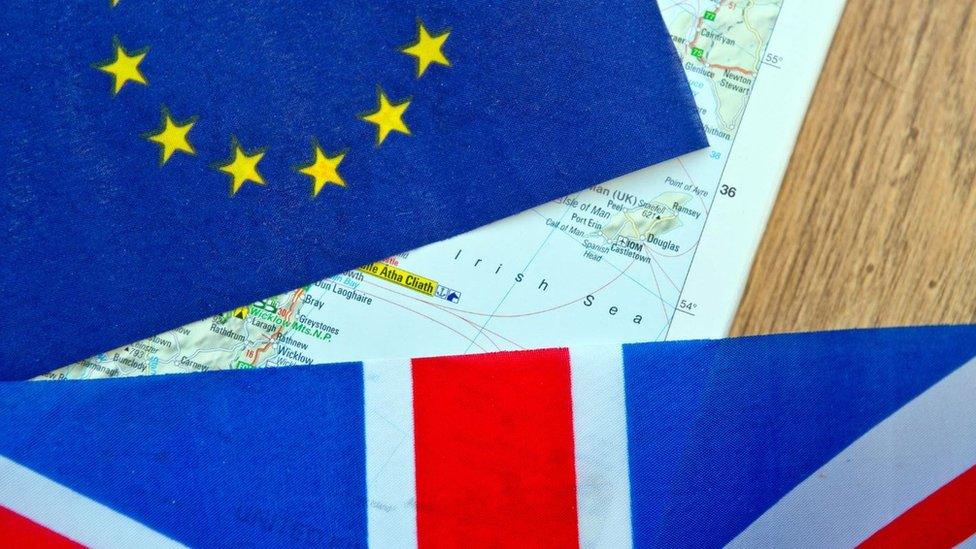Brexit: EU warns UK over Irish Sea border goods checks
- Published
- comments
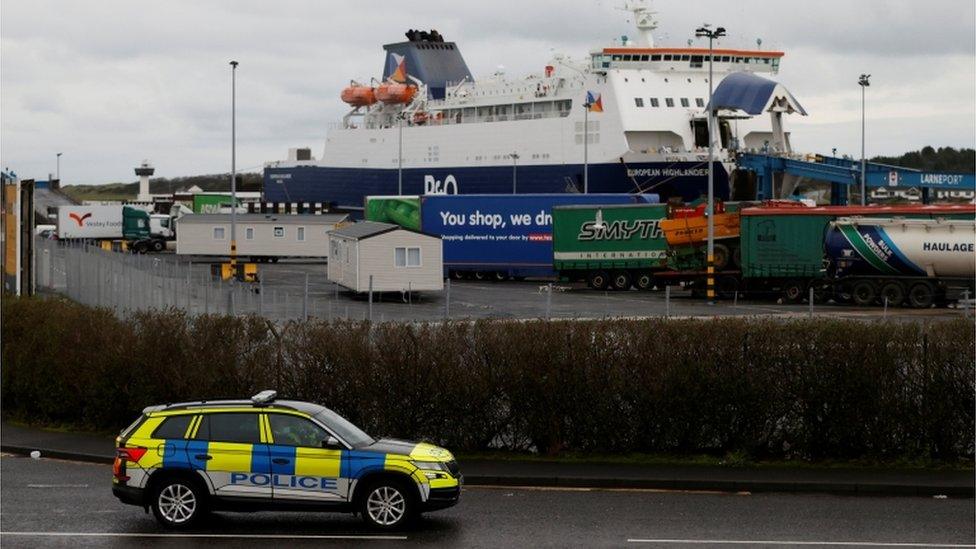
Intensive talks are taking place on the NI Protocol which created a trade border in the Irish Sea
The EU has warned the UK not to take any further unilateral action to delay post-Brexit checks on products entering Northern Ireland from Britain.
The warning came from the European Commission's vice president.
Maros Sefcovic said the EU "will not be shy in reacting swiftly, firmly and resolutely to ensure that the UK abides by its international law obligations".
It comes as the two sides prepare to meet to assess possible simplifications of the Northern Ireland Protocol.
The protocol is the part of the Brexit deal that created a trade border in the Irish Sea, in order to prevent goods checks along the Irish land border.
The 2019 deal kept Northern Ireland in the EU single market for goods and means EU customs rules are now enforced at its ports.
It was agreed that the checks would be phased in through the use of so-called "grace periods".
But earlier this year the UK unilaterally extended and enhanced some of these grace periods.
'Bonkers'
The next phase of new controls, affecting chilled meat products like sausages and mince, are due to begin next month after the grace period overseeing them ends.
By 1 July, the products will be prohibited from moving from Great Britain to Northern Ireland, or the grace period will be extended either by agreement or unilaterally by the UK.
In an article for the Daily Telegraph newspaper, external, Mr Sefcovic writes: 'If the UK takes further unilateral action over the coming weeks, the EU will not be shy in reacting swiftly, firmly and resolutely to ensure that the UK abides by its international law obligations."

The sausage and the chicken nugget have long enjoyed the right to roam around the UK; their legal passage from Great Britain to Northern Ireland assured.
But this is due to end in a little over three weeks.
The Brexit deal included an agreement that some products would be checked within the UK - when moved from Britain to Northern Ireland - as an alternative to a hard border with the Republic.
And the movement of some goods, including chilled meats, would be banned, albeit after a grace period - that expires at the end of this month.
The government regards the prospect of blocking the free movement of the sausage within the UK as ridiculous and has claimed the European Union is acting with what it called "legal purism".
The EU is threatening to act "swiftly, firmly and resolutely" to ensure the UK abides by its "obligations under international law" as Brussels sees them.

The British government agreed to the protocol in late 2019 but there have been some problems since it came into operation in January this year, and the UK is now seeking changes.
George Eustice, the UK's Agriculture Minister, described the chilled meats issue as "bonkers" on Radio 4's Today programme on Tuesday.
On Monday, the UK's Brexit Minister Lord Frost admitted the UK had "underestimated" the effect of the protocol on goods movements to Northern Ireland.
In an article in the Financial Times, he accused the EU of "legal purism" and called for "pragmatic solutions between friends, not the imposition of one side's rules on the other".
Access to medicines
However, in his Daily Telegraph article on Tuesday, Mr Sefcovic denied that the EU had been intransigent over the protocol.
"Far from being inflexible, the EU has shown from the very beginning that we are willing to find creative solutions when required," the European Commission vice president wrote.
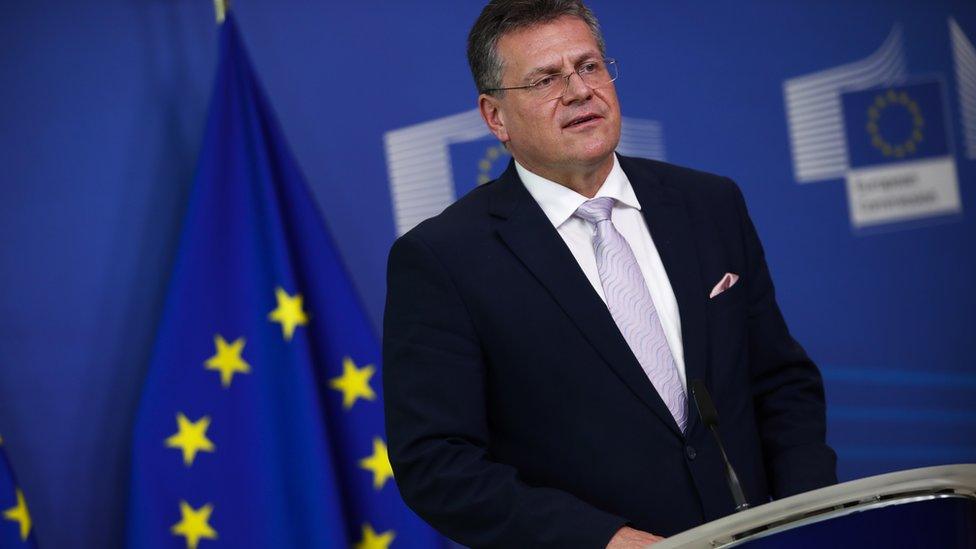
Maros Sefcovic said the EU would react swiftly, firmly and resolutely to any UK unilateral changes to the protocol
"The continued availability of medicines to Northern Ireland is among those tailor-made flexible solutions - something I personally take very seriously in this time of pandemic."
Mr Sefcovic added that the EU team was "working hard to find ways to ensure that the protocol is implemented in a way that both facilitates the everyday life of Northern Ireland's communities and preserves the integrity of the EU's Single Market".
He stressed the need for UK-EU cooperation to implement the existing 2019 deal, saying "we should not waste time turning the tables and washing our hands of an agreement that we shaped, agreed and signed jointly".
EU concessions
The EU-UK Joint Committee is due to meet in London on Wednesday to review progress on technical talks that have been examining ways to simplify the Northern Ireland Protocol.
Officials have been holding intensive talks, but there is little expectation of a major breakthrough at the meeting.
It is understood UK officials believe there has been significant progress in only two of about 30 problem areas and each side has accused the other of a lack of real engagement
However, the EU is preparing to offer a number of concessions, that would include:
Ensuring "uninterrupted supply" for medicines destined for Northern Ireland that have been authorised by the UK
Flexibility on steel quotas and tariffs which have affected Northern Ireland in a way that was "not anticipated in the protocol"
A pet passport exemption for guide dogs entering Northern Ireland from Great Britain
An easing of livestock rules to avoid "multiple tagging"
But an EU official said the EU's patience with the UK was "wearing thin" and warned that there could be trade sanctions if there is no breakthrough on implementing the protocol by next month.
'Solutions needed'
Ahead of Wednesday's meeting, Northern Ireland business groups urged the UK and EU to find "immediate solutions" to Irish Sea border trading problems.
"We cannot afford another missed opportunity at the joint committee," said the Northern Ireland Business Brexit Working Group - a coalition of organisations and companies.
"We continue to hear that the EU and UK are committed to their assertion in the preamble to the protocol that they are 'determined that the application of this protocol should impact as little as possible on the everyday life of communities in both Ireland and Northern Ireland'.
"But it undoubtedly is having an impact and will increasingly do so as more stringent requirements come in from October."
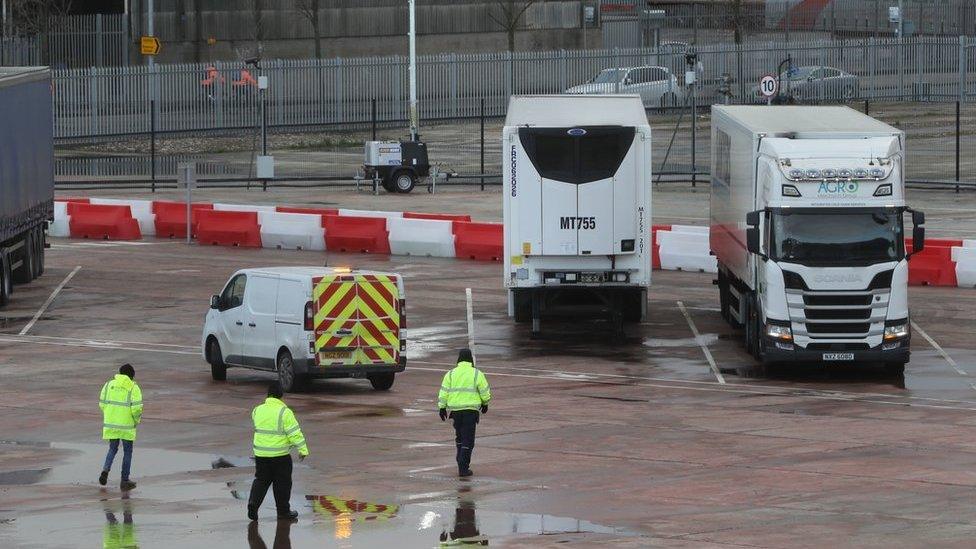
Customs checks are carried out at ports in Northern Ireland as a result of the new trade rules
It added: "We are heartened by the increased level of engagement that we have had in the past few weeks and months, however, we need to see that our faith in this process is justified by the delivery of solutions."
The working group added that there will be opportunities under the protocol, given the access it gives to both the UK and EU markets, but trade frictions need to be removed for the economy as a whole.
Meanwhile, the Northern Ireland trade union representative body, NIC ICTU, said "a space has to be created that acknowledges the practical problems with the protocol while also respecting the integrity of EU single market".
It added that it is "not acceptable or credible that those who demanded a hard Brexit now say the 'protocol must go!' This simplistic rhetoric misleads and abuses the electorate and encourages division."
But it said: "The concerns of many within the unionist community around the practical issues with the protocol need to be respected, considered and addressed."
- Published7 June 2021
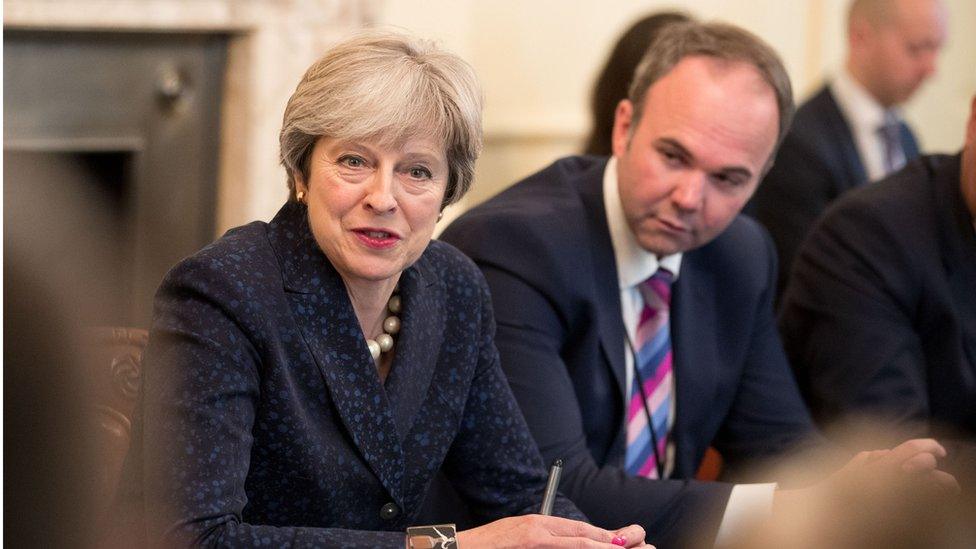
- Published7 May 2021

- Published23 January 2021
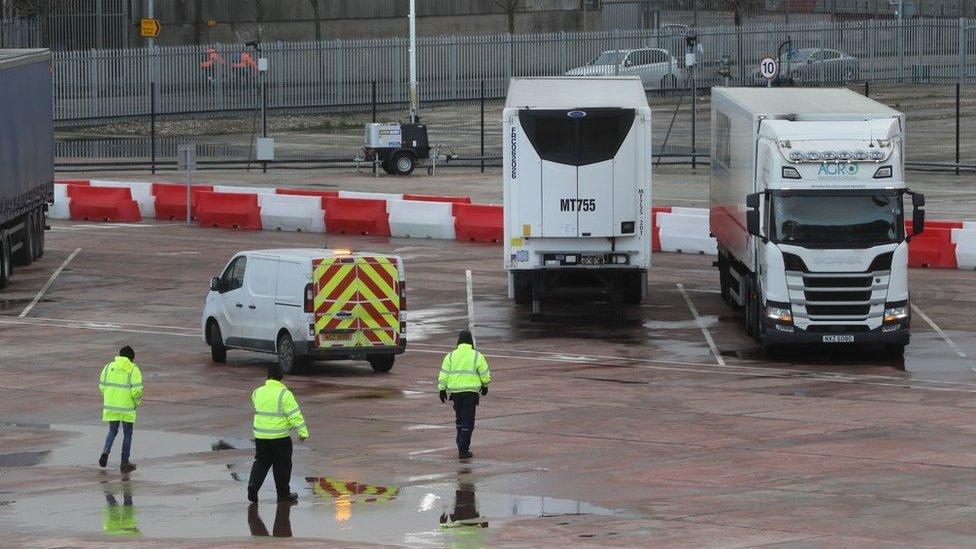
- Published2 February 2024

- Published5 June 2020
